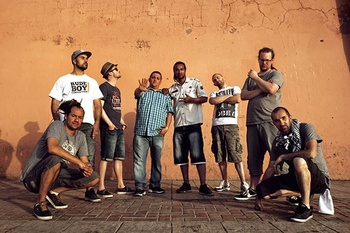(© Alexis Rieger)
Dub Inc, one of the biggest names in French reggae, is known for having two lead singers with very different styles: a big Rasta who does raggamuffin and a singer with Kabyle roots who mixes reggae with rai. The band first saw the light of day in Saint-Étienne in 1997. In the course of four albums and a documentary film, Rude Boy Story, Dub Inc has become France’s most influential reggae group.
The rude boys are now ready to conquer the world with their fifth album, Paradise, with lyrics, for the first time, in English. “It came about quite naturally, as a result of playing abroad,” explains singer Aurélien “Komlan” Zohou. “As we have quite a few lyrics with a message, people asked us to translate them. We had written some in English and we kept that up, as it is the stuff in English that is most popular abroad."
The musical formula is still a mix of dancehall and reggae sung in Arabic?
Komlan: Yes and no. We have tried to break with existing formats. The rai and North African colour that Hakim [Meridja – BT] brings, comes from the fact that he sings in Arabic, but I don’t have to automatically do dancehall and hip hop. There is even an accordion on “Il faut qu’on ose”. I like to take some risks: it’s a challenge, compared to what is expected of us.
What’s it like, your Paradise?
Komlan: [Laughs] The album’s name is taken from the song of the same name, on which we talk about a false, plastic paradise, a false happiness brought to us by advertising and the consumer society. The empty side that makes us believe in the short term that we must be happy, but in the long term it destroys us more than it contributes. Our true paradise is a world of peace where we manage to understand each other and listen to each other.
Dub Inc breaks the moulds

But to get there, we need to make a Revolution first?
Komlan: Yes: on “Revolution” we talk about the environment and the planet. We have to break with the way things are going now in order to arrive at an individual revolution: everyone should make the effort and stop and think about their impact on the environment. Look at the system of production, at agriculture, at food. We keep on eating shit and supporting a system we know doesn’t work.
On “Foudagh” there is an oud (Arab lute) and traditional Berber singing, which is a nice surprise.
Komlan: On every album there is a piece where Hakim sings in Kabyle and does something more traditional. We wanted to go full throttle, so we invited an oud-player and a derbouka-player [percussion]. On the album it seems out of place, but it’s still 100% us.
“Enfants des ghettos” is dedicated to everyone excluded by the system, I take it.
Komlan: Yeah, that’s with Meta Dia [Meta and the Cornerstones – BT], a Senegalese who became a naturalised American in New York, and Alif Naaba from Burkina Faso. In the lyrics you have three different viewpoints, from Africa, the United States, and Europe, on growing up in shanty towns. It’s a universal theme: it could be a kid in Marseilles or in South America.
Dub Inc • 10/12, 20.00, €25/28, Ancienne Belgique, boulevard Anspachlaan 110, Brussel/Bruxelles, 02-548.24.24, www.abconcerts.be
Komlan: Yes: on “Revolution” we talk about the environment and the planet. We have to break with the way things are going now in order to arrive at an individual revolution: everyone should make the effort and stop and think about their impact on the environment. Look at the system of production, at agriculture, at food. We keep on eating shit and supporting a system we know doesn’t work.
On “Foudagh” there is an oud (Arab lute) and traditional Berber singing, which is a nice surprise.
Komlan: On every album there is a piece where Hakim sings in Kabyle and does something more traditional. We wanted to go full throttle, so we invited an oud-player and a derbouka-player [percussion]. On the album it seems out of place, but it’s still 100% us.
“Enfants des ghettos” is dedicated to everyone excluded by the system, I take it.
Komlan: Yeah, that’s with Meta Dia [Meta and the Cornerstones – BT], a Senegalese who became a naturalised American in New York, and Alif Naaba from Burkina Faso. In the lyrics you have three different viewpoints, from Africa, the United States, and Europe, on growing up in shanty towns. It’s a universal theme: it could be a kid in Marseilles or in South America.
Dub Inc • 10/12, 20.00, €25/28, Ancienne Belgique, boulevard Anspachlaan 110, Brussel/Bruxelles, 02-548.24.24, www.abconcerts.be
Read more about: Muziek
Fijn dat je wil reageren. Wie reageert, gaat akkoord met onze huisregels. Hoe reageren via Disqus? Een woordje uitleg.